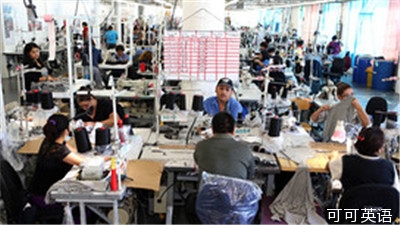(单词翻译:单击)

The hue and cry has gone up on both sides of the Atlantic among the righteous: raise the minimum wage! This ideological chant is considered an answer to poverty, inequality and even the route to productivity growth. But it is none of them: it is populist politics and bad economics.
大西洋两岸的正义之声越发响亮:提高最低工资吧!这种意识形态化的呼声被视为贫穷和不平等的解决之道,甚至是促进生产率增长的方法。但事实并非如此,相反,从政治学来讲它是民粹主义,从经济学来讲也糟糕之极。
If the price of labour rises, demand is likely to fall. That means fewer jobs. In the 21 EU countries with a minimum wage, unemployment is on average almost 50 per cent higher than in the seven countries without such legislation. Obliging business to pay staff more does not increase economic activity; it is merely redistribution but with added collateral damage.
如果劳动力价格上涨,对劳动力的需求可能下降,从而导致就业岗位减少。在21个制定最低工资标准的欧盟(EU)国家中,失业率平均比未制定最低工资的7国高出近50%。强迫企业提高员工薪酬不能促进经济活动;这样做不过是再分配,而且有副作用。
Fantasists and fanatics believe that across-the-board pay increases suddenly improve staff productivity. Sadly it is not the case – employees are doing the same job, just being paid more. Minimum wage increases are not performance-related – so why would anyone work harder if given a fixed, statutory increase?
幻想家和狂热分子以为,全面涨薪可以骤然提高员工生产率。但遗憾的是,事实并非如此:员工干的是同样的活,只是工资增加了。提高最低工资与绩效完全无关。既然是依法提高固定额度的薪水,人们为什么还要更刻苦地工作呢?
When wages at the bottom rise, they push pay up through the entire system because employees want to keep differentials. Sharp wage increases lead to inflation. This all pushes up costs for companies, without higher sales or profits. Since returns must fall, these actions discourage investment. Through the downturn I invested to develop companies and help to create jobs. A large increase in the minimum wage in the UK would immediately freeze our hiring plans and cast doubt on future investments.
提高最低工资会引起整个薪酬体系的升高,因为员工希望保持工资级差。最低工资骤增还会引发通胀。这样增加了公司成本,但销售额和利润不会上升。由于回报率必然下降,这些举措将伤害投资积极性。在衰退期间,我投资了一些企业,帮助它们发展,这创造了就业岗位。如果英国大幅提高最低工资,我们的招聘计划将立即冻结,未来的投资也会蒙上疑云。
One of the tragedies of the minimum wage is that it is a tax on those companies that are large employers of the least well educated and those who do not possess scarce skills. Citizens at the bottom are further squeezed out of the market because they have become more expensive. It is a form of punishment for that cohort. Minimum wage increases positively encourage companies to seek alternatives to labour, such as outsourcing or automation. Even restaurants can move in this direction. If restaurateurs are obliged to pay more, then watch them adopt technology such as computerised ordering and buy more ready- prepared dishes made in industrial plants with lots of machines.
最低工资的一个害处是,它相当于对大量招聘教育水平低、没有稀缺技能工人的企业征收了一笔税。由于雇佣成本升高,底层公民被进一步挤出就业市场。这相当于对他们的惩罚。提高最低工资的举措会鼓励企业寻找劳动力的替代品,例如外包或自动化。就连餐馆都可以这样做。如果餐馆老板被强迫提高员工工资,他们会采用电脑点单系统等技术,从机械化的工厂采购更多由机器制作好的熟食。
The cheerleaders for minimum wage rises are typically academic economists. Most of them receive salaries from the taxpayer, directly or indirectly, and have never built a business or met a payroll. Their chief worries are publishing arcane papers; many can be wrong all their lives and never lose a penny of their own money. By contrast, entrepreneurs are the job creators and are the ones who go bust or give up if costs go up too much. They know that the answer to being stuck in a low-paid job is not coercion of the employer by the government to pay more but improved education for workers. Of course, that is a difficult and lengthy task to undertake: whereas a simple jump in the minimum wage seems quick and easy policy – but it actually undermines overall prosperity.
提高最低工资的倡导者通常是象牙塔里的经济学家。他们大多数人的工资直接或间接来自纳税人,从未创过业,也没给别人付过工资。他们最关心的是发表晦涩的论文;许多经济学家一生中可能犯过无数错误,但不会因此损失一分钱。相比之下,企业家是就业岗位的创造者,如果薪资成本太高,他们要么破产要么放弃。他们明白,低薪的解决办法不是让政府强迫雇主涨薪,而是提高工人教育水平。当然,这个任务艰巨而漫长,而提高最低工资似乎简单速效——但它有损总体的繁荣。
In Britain we have the nonsense of a national minimum wage, which means the same price for labour despite vast regional differentials in the cost of living, unemployment levels and so forth. The supposed science of a precise minimum wage is entirely undermined by this unfortunate truth. Implementing various minimum wages would be complicated – but it is ever thus when arbitrary regulations interrupt voluntary market exchanges.
英国实行全国统一最低工资的荒唐制度,这意味着尽管全国各地生活成本、失业率水平等等差异巨大,但劳动力的价格却是一样的。这个不幸的事实完全破坏了最低工资制度所谓的科学性。因地制宜制定不同的最低工资标准实施起来颇为复杂,但当主观武断的法规扰乱市场自由交换时,情况一贯是复杂的。
It sounds a lovely gesture to raise low pay. Impractical romantics see it as the moral thing to do. Who could possibly object, save a rapacious capitalist? What such theorists fail to realise is that it restricts opportunities, fuels inflation, discourages investment and promotes labour substitution. If governments are so keen on the idea, then they should exempt more low-income citizens from all income and payroll taxes. That would help make work more rewarding and make it more attractive to work than claim welfare. Working almost invariably offers more dignity and superior health outcomes than a life on benefits – which is why it is so important to defeat unemployment and support job creation, rather than hinder it.
提高最低工资听上去很美好。不切实际的理想主义者以为这样做是合乎道德的。除了贪婪的资本家以外,还有谁会反对?但理论家们没有认识到,这会限制机会,助长通胀,打击投资,鼓励企业寻找劳动力的替代品。如果政府热衷于这个想法,不妨免除更多低收入者的一切所得税和工资税。此举有助于提高工作报酬,也能让工作比领取救济金更具有吸引力。比起靠福利为生,工作几乎肯定能带来更多的尊严和健康——正因此,消除失业、促进(而不是阻碍)就业岗位的创造才如此重要。
Raising minimum wages would hit the unskilled poor and inexperienced young hardest by killing job opportunities. How does that reduce inequality?
提高最低工资尤其伤害那些缺乏技能的穷人和没有经验的年轻人,让他们没有就业机会。这怎么能减少不平等?


